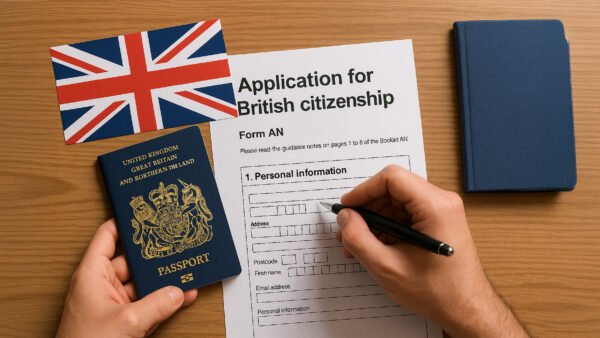Latest Posts

Complex Nationality Case: Navigating the Challenges of British Citizenship Applications
British nationality law is one of the most intricate legal frameworks in the world, shaped by centuries of historical events, legislative changes, and international agreements. While many applicants follow a straightforward path to citizenship through naturalisation or registration, others encounter significant legal and procedural hurdles due to factors such as ancestry, colonial history, and unique residency circumstances.
At Quastels, we frequently advise individuals with complex nationality issues, guiding them through the intricate requirements of British citizenship applications. This article explores some of the most challenging nationality cases and offers insight into how to navigate them successfully.
Understanding British Citizenship: Key Pathways and Challenges
British citizenship can be acquired through various legal routes, including:
- Naturalisation– The most common route for adults who have lawfully resided in the UK for a qualifying period.
- Registration– Available for certain individuals with a historical or familial connection to the UK.
- Descent and Double Descent– Citizenship can sometimes be passed down through generations, but restrictive rules apply.
- Discretionary Grants– In rare cases, the Home Office may grant citizenship based on exceptional circumstances.
While the process may appear straightforward, numerous factors can complicate an application. Below are some of the most frequent challenges we encounter in complex nationality cases.
1. Historical Anomalies and Colonial Connections
The British Empire’s vast reach has left a complicated legal legacy in nationality law. Many individuals from former British territories- including India, Pakistan, Kenya and Caribbean nations- may have inherited ambiguous nationality statuses.
Key Issues:
- British Overseas Territories and Commonwealth Citizens- Individuals born in former colonies may have had their status altered by independence movements, sometimes leaving them stateless or uncertain about their rights to British citizenship.
- Windrush-Style Cases- Some applicants may have been eligible for British nationality but lost their legal status due to administrative errors or changes in immigration policy.
- Hong Kong British Nationals- The transition of Hong Kong to China in 1997 created different categories of British nationality, such as British National (Overseas) (BN(O)) status, leading to confusion over citizenship rights.
How to Overcome These Challenges:
A thorough historical analysis of legal status, residence, and parental nationality is essential in these cases. Expert legal representation can help establish through archival records, previous legislation, and discretionary applications.
2. Citizenship by Descent and Double Descent
Many individuals believe they are entitled to British citizenship through ancestry, but the laws governing citizenship by descent are highly restrictive. British nationality can typically only be passed to one generation born outside the UK, except in limited cases of double descent.
Key Issues:
- Gender Discrimination in Past Laws- Before 1983, British mothers could not pass on their citizenship in the same way as British fathers, creating legal gaps that can now, in some cases, be rectified through discretionary registration.
- Double Descent Exceptions- In some cases, a grandchild of a British citizen may claim nationality, but only if specific historical criteria are met (e.g., the grandparent’s UK government service or residence requirements).
- Adopted and Illegitimate Children- The nationality status of children born outside marriage or adopted by British parents varies significantly depending on when and where they were born.
How to Overcome These Challenges:
A detailed review of ancestry, nationality laws in effect at the time of birth, and discretionary application options is required. In some cases, legal challenges may be necessary to establish a right to citizenship.
3. Good Character and Criminality Issues
British citizenship applicants must meet the “good character” requirement, which assesses their compliance with UK laws, financial integrity, and overall conduct.
Key Issues:
- Criminal Convictions- Even minor offences, including historical cautions or driving penalties, can impact an application.
- Financial Irregularities-Bankruptcy, tax issues, or immigration breaches (such as overstaying) can lead to refusals.
- Dishonesty in Previous Applications- If an individual has provided misleading information on previous visa or settlement applications, this can be grounds for refusal.
How to Overcome These Challenges:
A strong legal argument can be made in cases where the applicant has shown rehabilitation, extenuating circumstances, or where Home Office policies allow discretion. Detailed representations and evidence supporting good character are often critical in securing a positive outcome.
4. Continuous Residence and Absence Issues
Applicants for naturalisation must demonstrate a continuous period of lawful residence in the UK. However, strict absence limits apply.
Key Issues:
- Excessive Absences- Applicants who have spent too much time outside the UK may struggle to meet residency requirements.
- Gaps in Lawful Stay- Even minor technical breaches, such as visa expirations, can affect eligibility.
- Indefinite Leave to Remain (ILR) and EU Settled Status Applicants- Some long-term residents assume they are automatically eligible for citizenship, but additional criteria apply.
How to Overcome These Challenges:
Applicants with excessive absences can argue discretionary exemptions where absences were due to compelling circumstances, such as work obligations or family emergencies. Documentary evidence and legal representations are key in such cases.
5. Statelessness and Special Circumstances
Some individuals face nationality issues due to statelessness, often because of gaps in legal frameworks between different countries.
Key Issues:
- Children Born Without Recognised Nationality- Some children born in the UK or abroad may not automatically acquire any nationality, particularly in cases of disputed parentage or legal limbo between two countries.
- Refugee and Asylum Cases- Those granted asylum or humanitarian protection may seek citizenship but face additional scrutiny over identity and residence history.
How to Overcome These Challenges:
Statelessness applications require substantial legal expertise and comprehensive documentation to prove that no other nationality is available. The UK offers specific pathways to citizenship for stateless individuals, which must be pursued strategically.
How Quastels Can Help
At Quastels, we specialise in handling complex British nationality cases and have a wealth of experience in guiding clients through challenging citizenship applications. We offer:
- Expert legal analysis of historical nationality laws and complex ancestry cases.
- Tailored advice on discretionary applications and exceptional circumstances.
- Representation in applications and appeals against refusals.
- Support for individuals seeking to resolve past immigration issues affecting their citizenship eligibility.
Conclusion
British nationality law is nuanced and, for many applicants, far from straightforward. Complex nationality cases require detailed legal insight, historical knowledge, and strategic representation to achieve a successful outcome. Whether facing challenges due to ancestry, historical discrimination, good character requirements, or residence complexities, professional legal guidance is essential.
At Quastels, we are committed to assisting individuals in securing their rightful British citizenship. If you require advice on a complex nationality case, contact our team today for expert guidance.
Get in touch with us to discuss your citizenship application.
Read More
Key Considerations When Selling Your Business
Deciding to sell your business is a momentous and often complex decision. Once you’ve made the choice, it’s crucial to approach the process strategically to ensure a successful outcome. While seeking professional legal advice early on is vital, understanding some fundamental aspects in advance can greatly benefit your planning.
Share Sale or Asset Sale?
One of the first decisions to make is whether you’ll sell shares of the company or just the assets of the business.
- Share Sale: This involves transferring ownership of the company, including all its assets and liabilities, to the buyer.
- Asset Sale: Here, only specific assets of the business—such as property, equipment, intellectual property, or goodwill—are sold, leaving the original company and its liabilities with the seller.
Understanding Share Sales vs Asset Sales
The decision between a share sale and an asset sale is influenced by legal, financial, and commercial considerations for both parties.
Share Sale
In a share sale, the buyer typically acquires the entire company, including its assets, liabilities, and obligations. This allows the business to continue operating seamlessly.
Advantages for Sellers:
- Simplicity: the entire company is transferred, making the process less burdensome for the seller.
- Continuity: operations can continue uninterrupted, minimising disruptions for employees, customers and suppliers.
- Potential Tax Efficiency: selling shares is often more tax-efficient, particularly if you qualify for Business Asset Disposal Relief (BADR). Formerly known as Entrepreneurs’ Relief, BADR allows eligible sellers to benefit from a reduced capital gains tax rate when selling their business. It is important to seek advice from a qualified tax adviser to maximise any available reliefs.
Disadvantages for Sellers:
- Buyer’s Risk: buyers may demand extensive warranties and indemnities to offset the risk of inheriting unknown liabilities.
- Pricing Pressure: buyers might reduce their offer to account for potential liabilities within the company, impacting the overall sale value.
Asset Sale
In an asset sale, the buyer acquires only selected assets, allowing them to leave behind liabilities.
Advantages for Sellers:
- Flexibility: sellers can retain parts of the business they wish to keep or sell separately later.
- Buyer Appeal: the reduced risk for buyers can make the transition simpler and quicker to negotiate.
Disadvantages for Sellers:
- Tax Complexity: asset sales can be less tax-efficient, often leading to taxation at both corporate and shareholder levels.
- Practical Challenges: transferring individual assets such as property, contracts, or employees can involve time-consuming legal processes.
- Retained Responsibilities: sellers must manage remaining liabilities, wind up the company, and deal with any leftover debts or assets.
Conclusion
Selling your business is a significant milestone that required thorough planning and careful execution. Understanding whether a share sale or an asset sale suits your goals, addressing tax implications, and preparing your business for the market can help you achieve a smooth and financially rewarding exit.
At Quastels LLP, our Corporate Department is equipped with experienced legal advisors who provide tailored guidance and ensure your interests are protected at every stage of the transaction. Let us help you navigate this important journey with confidence and clarity.
Read More
Quastels Advises Rainbowwave on the Sale of the Company to the Rainbowwave Employee Ownership Trust
We were delighted to advise the founders of Rainbowwave on the sale of the company to the Rainbowwave Employee Ownership Trust, marking an exciting new chapter for the global fashion agency and its team. The transaction was led by Partner Adam Convisser, who guided the sellers through the process from start to finish.
Employee Ownership Trusts are increasingly popular succession option for business owners looking to preserve their company’s legacy, reward their team, and foster a strong culture of collaboration and shared success. By moving to an employee-owned model, Rainbowwave is not only securing the future of the business, but also empowering its employees to share in that success.
Maria Lemos commented:
“We are incredibly grateful to Adam and the team for their calm, clear and expert guidance throughout the process. This was a significant milestone for us, and Adam’s advice at every stage gave us real confidence that our interests were protected and that the transaction was being handled with care and professionalism.”
Congratulations to the whole team at Rainbowwave!
Read More